Show code cell content
! pip install tess-atlas -q
from tess_atlas.utils import notebook_initalisations
notebook_initalisations()
TESS Atlas fit for TOI 3114#
Version: ‘0.2.1.dev314+ge1761e8’
Note: This notebook was automatically generated as part of the TESS Atlas project. More information can be found on GitHub: github.com/dfm/tess-atlas
In this notebook, we do a quicklook fit for the parameters of the TESS Objects of Interest (TOI) in the system number 3114. To do this fit, we use the exoplanet library and you can find more information about that project at exoplanet.dfm.io.
From here, you can
scroll down and take a look at the fit results
open the notebook in Google Colab to run the fit yourself
download the notebook
Caveats#
There are many caveats associated with this relatively simple “quicklook” type of analysis that should be kept in mind. Here are some of the main things that come to mind:
The orbits that we fit are constrained to be circular. One major effect of this approximation is that the fit will significantly overestimate the confidence of the impact parameter constraint, so the results for impact parameter shouldn’t be taken too seriously.
Transit timing variations, correlated noise, and (probably) your favorite systematics are ignored. Sorry!
This notebook was generated automatically without human intervention. Use at your own risk!
Getting started#
To get going, we’ll add some magic, import some packages, and run some setup steps.
Show code cell content
%load_ext autoreload
%load_ext memory_profiler
%load_ext autotime
%autoreload 2
# %matplotlib inline
import os
import numpy as np
import pymc3_ext as pmx
from arviz import InferenceData
from tess_atlas.analysis.eccenticity_reweighting import (
calculate_eccentricity_weights,
)
from tess_atlas.analysis.model_tools import (
compute_variable,
get_untransformed_varnames,
sample_prior,
)
from tess_atlas.data.inference_data_tools import (
get_optimized_init_params,
summary,
test_model,
)
from tess_atlas.data.tic_entry import TICEntry
from tess_atlas.logger import get_notebook_logger
from tess_atlas.plotting import (
plot_diagnostics,
plot_eccentricity_posteriors,
plot_inference_trace,
plot_lightcurve,
plot_phase,
plot_posteriors,
plot_priors,
plot_raw_lightcurve,
)
TOI_NUMBER = 3114
logger = get_notebook_logger(outdir=f"toi_{TOI_NUMBER}_files")
Downloading Data#
Next, we grab some inital guesses for the TOI’s parameters from ExoFOP and download the TOI’s lightcurve with Lightkurve.
We wrap the information in three objects, a TIC Entry, a Planet Candidate and finally a Lightcurve Data object.
The
TIC Entryobject holds one or morePlanet Candidates (each candidate associated with one TOI id number) and aLightcurve Datafor associated with the candidates. Note that theLightcurve Dataobject is initially the same fopr each candidate but may be masked according to the candidate transit’s period.The
Planet Candidateholds information on the TOI data collected by SPOC (eg transit period, etc)The
Lightcurve Dataholds the lightcurve time and flux data for the planet candidates.
Downloading the data (this may take a few minutes):
tic_entry = TICEntry.load(toi=TOI_NUMBER)
tic_entry
time: 620 ms (started: 2023-08-11 14:16:36 +10:00)
| TOI | 3114.01 |
|---|---|
| TOI | 3114.01 |
| Classification | Planet Candidate |
| Period (days) | 4.407111 |
| Epoch (TBJD) | 2331.60796 |
| Depth (ppt) | 9.14 |
| Duration (days) | 0.088917 |
| Planet SNR | 61.0 |
| Single Transit | False |
| PE Pipeline | QLP |
| Comments | found in faint-star QLP search |
More data on ExoFOP page
If the amount of lightcurve data availible is large we filter the data to keep only data around transits.
if tic_entry.lightcurve.len > 1e5:
tic_entry.lightcurve.filter_non_transit_data(tic_entry.candidates)
else:
logger.info("Using the full lightcurve for analysis.")
time: 1.08 ms (started: 2023-08-11 14:16:36 +10:00)
Plot of the lightcurve:
plot_lightcurve(tic_entry, save=True)
# Some diagnostics
plot_raw_lightcurve(tic_entry, save=True)
plot_raw_lightcurve(tic_entry, zoom_in=True, save=True)
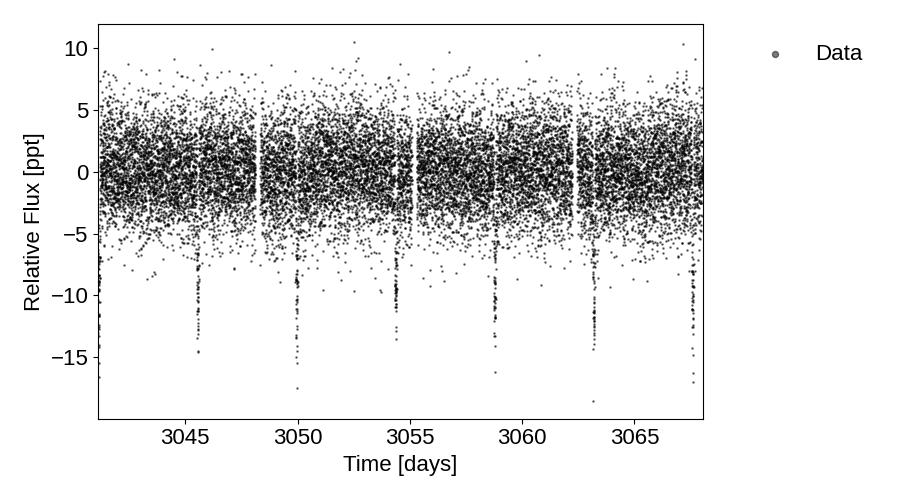
Diagnostic plots of the raw lightcurve (not applying sigma clipping/other cleaning methods to remove outliers). Some things to consider:
Do the initial fits from ExoFOP match the transits if visible?
If this is marked as a single-transit event, is there only 1 transit visible?
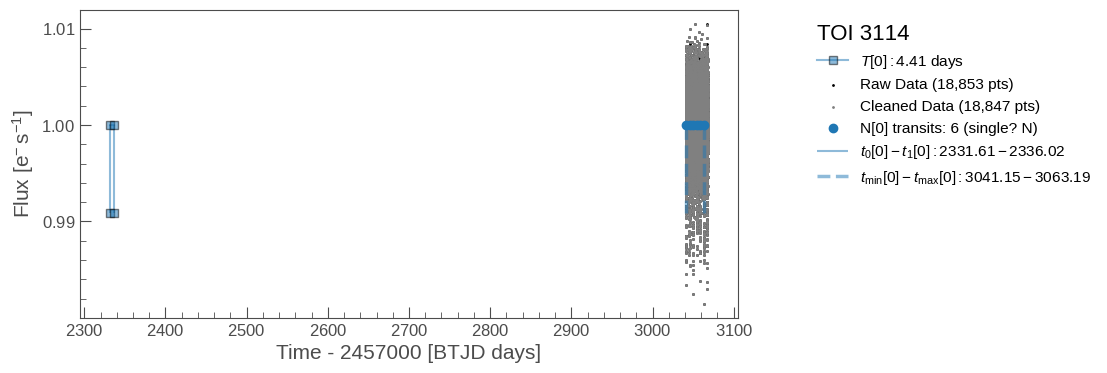
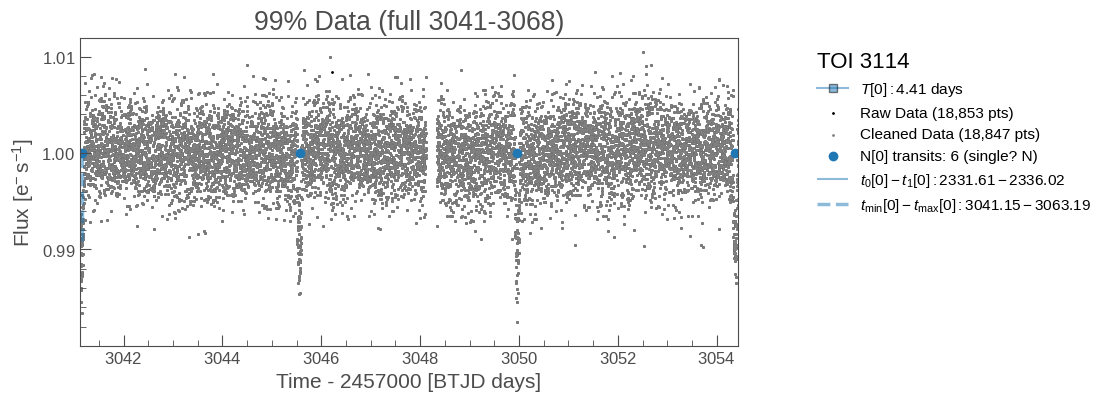
Fitting transit parameters#
Now that we have the data, we can define a Bayesian model to fit it.
The probabilistic model#
We use the probabilistic model as described in Foreman-Mackey et al 2017 to determine the best parameters to fit the transits present in the lightcurve data.
More explicitly, the stellar light curve $l(t; \vec{\theta})$ is modelled with a Gaussian Process (GP). A GP consists of a mean function $\mu(t;\vec{\theta})$ and a kernel function $k_\alpha(t,t’;\vec{\theta})$, where $\vec{\theta}$ is the vector of parameters descibing the lightcurve and $t$ is the time during which the lightcurve is under observation
The 8 parameters describing the lightcurve are $$\vec{\theta} = {d_i, t0_i, tmax_i, b_i, r_i, f0, u1, u2},$$ where
$d_i$ transit durations for each planet,
$tmin_i$ time of first transit for each planet (reference time),
$tmax_i$ time of the last transit for each planet (a second reference time),
$b_i$ impact parameter for each planet,
$r_i$ planet radius in stellar radius for each planet,
$f0$ baseline relative flux of the light curve from star,
$u1$ $u2$ two parameters describing the limb-darkening profile of star.
Note: if the observed data only records a single transit, we swap $tmax_i$ with $p_i$ (orbital periods for each planet).
With this we can write $$l(t;\vec{\theta}) \sim \mathcal{GP} (\mu(t;\vec{\theta}), k_\alpha(t,t’;\vec{\theta}))\ .$$
Here the mean and kernel functions are:
$\mu(t;\vec{\theta})$: a limb-darkened transit light curve (Kipping 2013)
$k_\alpha(t,t’;\vec{\theta}))$: a stochastically-driven, damped harmonic oscillator (SHOTterm)
Now that we have defined our transit model, we can implement it in python (toggle to show).
Show code cell content
import aesara_theano_fallback.tensor as tt
import exoplanet as xo
import numpy as np
import pymc3 as pm
import pymc3_ext as pmx
from celerite2.theano import GaussianProcess, terms
DEPTH = "depth"
DURATION = "dur"
RADIUS_RATIO = "r"
TIME_START = "tmin"
TIME_END = "tmax"
ORBITAL_PERIOD = "p"
MEAN_FLUX = "f0"
LC_JITTER = "jitter"
GP_RHO = "rho"
GP_SIGMA = "sigma"
RHO_CIRC = "rho_circ" # stellar density at e=0
LIMB_DARKENING_PARAM = "u"
IMPACT_PARAM = "b"
def get_test_duration(min_durations, max_durations, durations):
largest_min_duration = np.amax(
np.array([durations, 2 * min_durations]), axis=0
)
smallest_max_duration = np.amin(
np.array([largest_min_duration, 0.99 * max_durations]), axis=0
)
return smallest_max_duration
def build_planet_transit_model(tic_entry):
t = tic_entry.lightcurve.time
y = tic_entry.lightcurve.flux
yerr = tic_entry.lightcurve.flux_err
n = tic_entry.planet_count
tmins = np.array([planet.tmin for planet in tic_entry.candidates])
depths = np.array([planet.depth for planet in tic_entry.candidates])
durations = np.array([planet.duration for planet in tic_entry.candidates])
max_durations = np.array(
[planet.duration_max for planet in tic_entry.candidates]
)
min_durations = np.array(
[planet.duration_min for planet in tic_entry.candidates]
)
test_duration = get_test_duration(min_durations, max_durations, durations)
with pm.Model() as my_planet_transit_model:
## define planet parameters
# 1) d: transit duration (duration of eclipse)
d_priors = pm.Bound(
pm.Lognormal, lower=min_durations, upper=max_durations
)(
name=DURATION,
mu=np.log(durations),
sigma=np.log(1.2),
shape=n,
testval=test_duration,
)
# 2) r: radius ratio (planet radius / star radius)
r_priors = pm.Lognormal(
name=RADIUS_RATIO, mu=0.5 * np.log(depths * 1e-3), sd=1.0, shape=n
)
# 3) b: impact parameter
b_priors = xo.distributions.ImpactParameter(
name=IMPACT_PARAM, ror=r_priors, shape=n
)
planet_priors = [r_priors, d_priors, b_priors]
## define orbit-timing parameters
# 1) tmin: the time of the first transit in data (a reference time)
tmin_norm = pm.Bound(
pm.Normal, lower=tmins - max_durations, upper=tmins + max_durations
)
tmin_priors = tmin_norm(
TIME_START, mu=tmins, sigma=0.5 * durations, shape=n, testval=tmins
)
# 2) period: the planets' orbital period
p_params, p_priors_list, tmax_priors_list = [], [], []
for n, planet in enumerate(tic_entry.candidates):
# if only one transit in data we use the period
if planet.has_data_only_for_single_transit:
p_prior = pm.Pareto(
name=f"{ORBITAL_PERIOD}_{planet.index}",
m=planet.period_min,
alpha=2.0 / 3.0,
testval=planet.period,
)
p_param = p_prior
tmax_prior = planet.tmin
# if more than one transit in data we use a second time reference (tmax)
else:
tmax_norm = pm.Bound(
pm.Normal,
lower=planet.tmax - planet.duration_max,
upper=planet.tmax + planet.duration_max,
)
tmax_prior = tmax_norm(
name=f"{TIME_END}_{planet.index}",
mu=planet.tmax,
sigma=0.5 * planet.duration,
testval=planet.tmax,
)
p_prior = (tmax_prior - tmin_priors[n]) / planet.num_periods
p_param = tmax_prior
p_params.append(p_param) # the param needed to calculate p
p_priors_list.append(p_prior)
tmax_priors_list.append(tmax_prior)
p_priors = pm.Deterministic(ORBITAL_PERIOD, tt.stack(p_priors_list))
tmax_priors = pm.Deterministic(TIME_END, tt.stack(tmax_priors_list))
## define stellar parameters
# 1) f0: the mean flux from the star
f0_prior = pm.Normal(name=MEAN_FLUX, mu=0.0, sd=10.0)
# 2) u1, u2: limb darkening parameters
u_prior = xo.distributions.QuadLimbDark("u")
stellar_priors = [f0_prior, u_prior]
## define k(t, t1; parameters)
jitter_prior = pm.InverseGamma(
name=LC_JITTER, **pmx.estimate_inverse_gamma_parameters(1.0, 5.0)
)
sigma_prior = pm.InverseGamma(
name=GP_SIGMA, **pmx.estimate_inverse_gamma_parameters(1.0, 5.0)
)
rho_prior = pm.InverseGamma(
name=GP_RHO, **pmx.estimate_inverse_gamma_parameters(0.5, 10.0)
)
kernel = terms.SHOTerm(sigma=sigma_prior, rho=rho_prior, Q=0.3)
noise_priors = [jitter_prior, sigma_prior, rho_prior]
## define the lightcurve model mu(t;paramters)
orbit = xo.orbits.KeplerianOrbit(
period=p_priors,
t0=tmin_priors,
b=b_priors,
duration=d_priors,
ror=r_priors,
)
star = xo.LimbDarkLightCurve(u_prior)
lightcurve_models = star.get_light_curve(orbit=orbit, r=r_priors, t=t)
lightcurve = 1e3 * pm.math.sum(lightcurve_models, axis=-1) + f0_prior
my_planet_transit_model.lightcurve_models = lightcurve_models
rho_circ = pm.Deterministic(name=RHO_CIRC, var=orbit.rho_star)
# Finally the GP likelihood
residual = y - lightcurve
gp_kwargs = dict(diag=yerr**2 + jitter_prior**2, quiet=True)
gp = GaussianProcess(kernel, t, **gp_kwargs)
gp.marginal(name="obs", observed=residual)
my_planet_transit_model.gp_mu = gp.predict(residual, return_var=False)
# cache params
my_params = dict(
planet_params=planet_priors,
noise_params=noise_priors,
stellar_params=stellar_priors,
period_params=p_params,
)
return my_planet_transit_model, my_params
time: 39.9 ms (started: 2023-08-11 14:16:38 +10:00)
planet_transit_model, params = build_planet_transit_model(tic_entry)
model_varnames = get_untransformed_varnames(planet_transit_model)
test_model(planet_transit_model)
time: 3min 27s (started: 2023-08-11 14:16:39 +10:00)
Optimizing the initial point for sampling#
We help out the sampler we try to find an optimized set of initial parameters to begin sampling from.
if tic_entry.optimized_params is None:
init_params = get_optimized_init_params(planet_transit_model, **params)
tic_entry.save_data(optimized_params=init_params)
else:
init_params = tic_entry.optimized_params.to_dict()
# sanity check that none of the right hand column have nans!
test_model(planet_transit_model, init_params, show_summary=True)
time: 2.04 s (started: 2023-08-11 14:20:07 +10:00)
| Test Point | log P(test-point) | |
|---|---|---|
| dur_interval__ | -2.229 | 0.25 |
| r_log__ | -2.348 | -0.92 |
| b_impact__ | -0.175 | -1.56 |
| tmin_interval__ | 0.0 | 1.38 |
| tmax_1_interval__ | 0.0 | 1.38 |
| f0 | 0.0 | -3.22 |
| u_quadlimbdark__ | 0.0 | -2.78 |
| jitter_log__ | 0.556 | -19.94 |
| sigma_log__ | 0.556 | -6.06 |
| rho_log__ | 0.053 | -1.99 |
| obs | NaN | -45804.69 |
Below are plots of our initial model and priors.
Initial model fit#
initial_lc_models = (
compute_variable(
model=planet_transit_model,
samples=[[init_params[n] for n in model_varnames]],
target=planet_transit_model.lightcurve_models,
)
* 1e3
)
plot_lightcurve(
tic_entry, initial_lc_models, save="lightcurve_with_initial_guess.png"
)
plot_lightcurve(
tic_entry,
initial_lc_models,
zoom_in=True,
save="lightcurve_with_initial_guess_zoom.png",
)
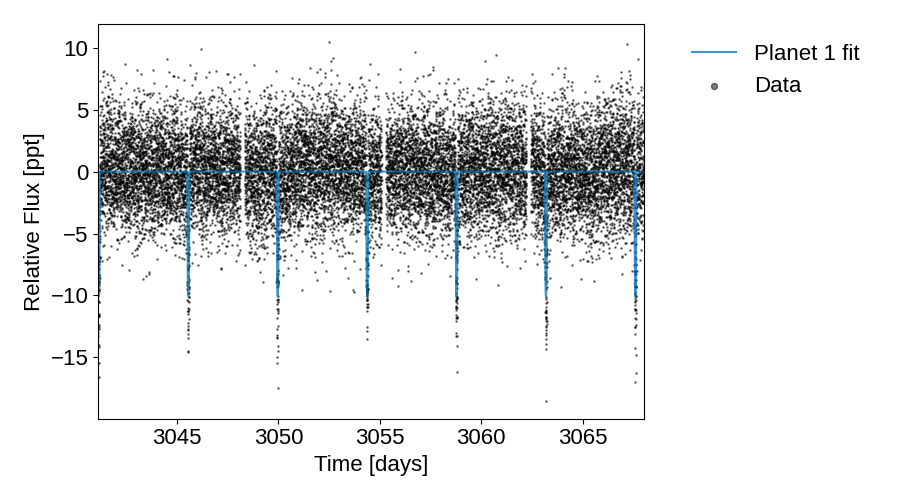
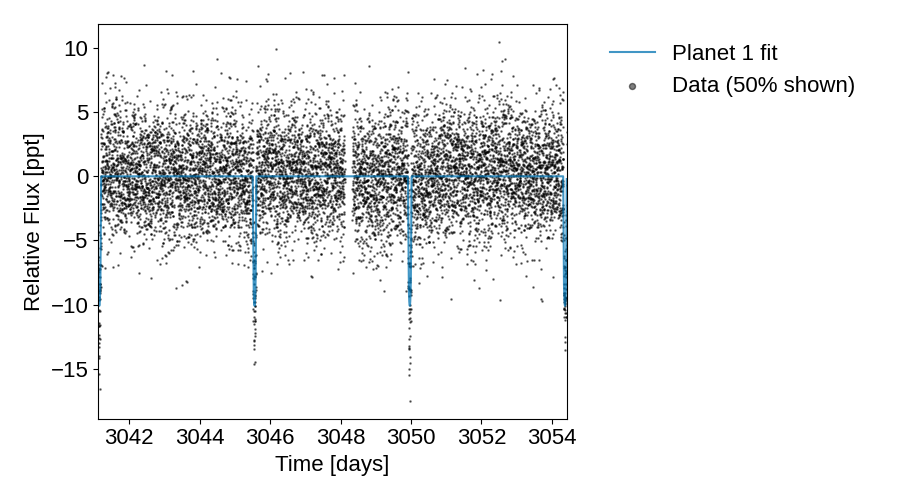
params = dict(
tic_entry=tic_entry, model=planet_transit_model, initial_params=init_params
)
plot_phase(**params, save="phase_initial.png")
plot_phase(
**params, plot_all_datapoints=True, save="phase_initial_all_datapoints.png"
)

Diagnostic phase plot

Histograms of Priors#
prior_samples = sample_prior(planet_transit_model)
if prior_samples:
plot_priors(tic_entry, prior_samples, init_params, save=True)
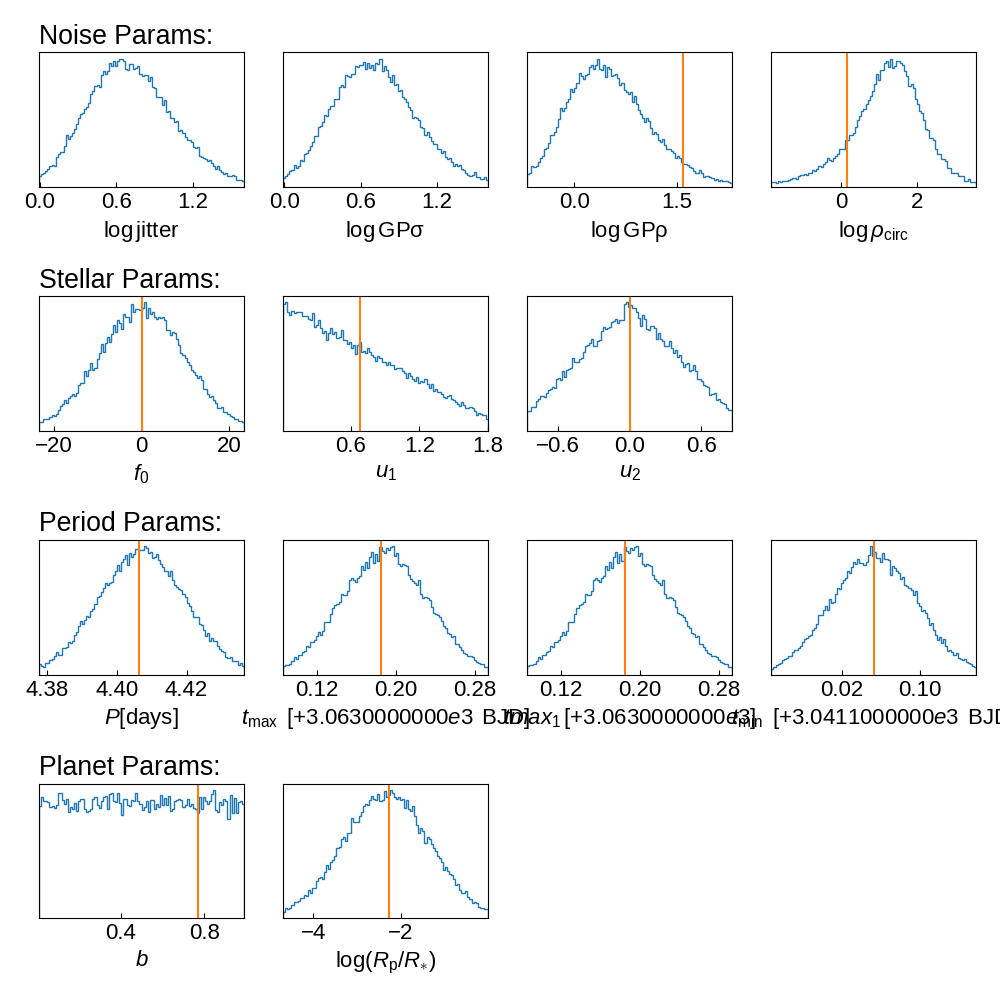
Sampling#
With the model and priors defined, we can begin sampling.
def run_inference(model) -> InferenceData:
np.random.seed(TOI_NUMBER)
with model:
sampling_kwargs = dict(tune=2000, draws=2000, chains=2, cores=2)
logger.info(f"Run sampler with kwargs: {sampling_kwargs}")
inference_data = pmx.sample(
**sampling_kwargs, start=init_params, return_inferencedata=True
)
logger.info("Sampling completed!")
return inference_data
time: 1.13 ms (started: 2023-08-11 14:20:25 +10:00)
if tic_entry.inference_data is None:
inference_data = run_inference(planet_transit_model)
tic_entry.inference_data = inference_data
tic_entry.save_data(inference_data=inference_data)
else:
logger.info("Using cached run")
inference_data = tic_entry.inference_data
inference_data
time: 79.8 ms (started: 2023-08-11 14:20:25 +10:00)
-
- chain: 2
- draw: 2000
- dur_dim_0: 1
- r_dim_0: 1
- b_dim_0: 1
- tmin_dim_0: 1
- p_dim_0: 1
- tmax_dim_0: 1
- u_dim_0: 2
- rho_circ_dim_0: 1
- chain(chain)int640 1
array([0, 1])
- draw(draw)int640 1 2 3 4 ... 1996 1997 1998 1999
array([ 0, 1, 2, ..., 1997, 1998, 1999])
- dur_dim_0(dur_dim_0)int640
array([0])
- r_dim_0(r_dim_0)int640
array([0])
- b_dim_0(b_dim_0)int640
array([0])
- tmin_dim_0(tmin_dim_0)int640
array([0])
- p_dim_0(p_dim_0)int640
array([0])
- tmax_dim_0(tmax_dim_0)int640
array([0])
- u_dim_0(u_dim_0)int640 1
array([0, 1])
- rho_circ_dim_0(rho_circ_dim_0)int640
array([0])
- f0(chain, draw)float64...
array([[ 0.18574 , 0.283016, 0.284388, ..., 0.00924 , 0.476914, 0.096777], [ 0.119078, -0.391297, 0.966168, ..., 0.397833, 0.389394, -0.033619]]) - dur(chain, draw, dur_dim_0)float64...
array([[[0.098485], [0.108954], ..., [0.105776], [0.101017]], [[0.106936], [0.10979 ], ..., [0.102598], [0.103302]]]) - r(chain, draw, r_dim_0)float64...
array([[[0.096716], [0.099897], ..., [0.101403], [0.098296]], [[0.099342], [0.100559], ..., [0.097131], [0.097683]]]) - b(chain, draw, b_dim_0)float64...
array([[[0.627601], [0.783912], ..., [0.80781 ], [0.660206]], [[0.724412], [0.777166], ..., [0.653668], [0.679634]]]) - tmin(chain, draw, tmin_dim_0)float64...
array([[[3041.150627], [3041.146473], ..., [3041.149503], [3041.150113]], [[3041.151752], [3041.15157 ], ..., [3041.149385], [3041.149163]]]) - tmax_1(chain, draw)float64...
array([[3063.186324, 3063.185025, 3063.18518 , ..., 3063.185482, 3063.185299, 3063.186266], [3063.184364, 3063.184095, 3063.186405, ..., 3063.184292, 3063.185258, 3063.18509 ]]) - p(chain, draw, p_dim_0)float64...
array([[[4.407139], [4.40771 ], ..., [4.407159], [4.40723 ]], [[4.406522], [4.406505], ..., [4.407175], [4.407185]]]) - tmax(chain, draw, tmax_dim_0)float64...
array([[[3063.186324], [3063.185025], ..., [3063.185299], [3063.186266]], [[3063.184364], [3063.184095], ..., [3063.185258], [3063.18509 ]]]) - u(chain, draw, u_dim_0)float64...
array([[[ 1.08502 , -0.508493], [ 0.067176, 0.832296], ..., [ 0.043681, 0.621034], [ 1.073923, -0.405155]], [[ 0.573817, 0.395965], [ 0.451628, 0.450136], ..., [ 0.988988, -0.164546], [ 0.690817, 0.015038]]]) - jitter(chain, draw)float64...
array([[0.451313, 0.399203, 0.395481, ..., 0.374344, 0.33904 , 0.487782], [0.402584, 0.37147 , 0.417432, ..., 0.365321, 0.368251, 0.409286]]) - sigma(chain, draw)float64...
array([[0.533349, 1.017009, 1.086486, ..., 0.970773, 1.039842, 0.775977], [1.103559, 0.81052 , 1.513262, ..., 0.879976, 0.886646, 0.660102]]) - rho(chain, draw)float64...
array([[ 2.877297, 9.11788 , 10.207965, ..., 5.334215, 8.742429, 7.795922], [ 9.218558, 6.710152, 25.427431, ..., 6.014941, 12.20938 , 11.624275]]) - rho_circ(chain, draw, rho_circ_dim_0)float64...
array([[[2.060182], [0.966655], ..., [0.965631], [1.776046]], [[1.254991], [0.973007], ..., [1.715305], [1.574285]]])
- created_at :
- 2023-07-19T07:57:20.854319
- arviz_version :
- 0.11.4
- inference_library :
- pymc3
- inference_library_version :
- 3.11.4
- sampling_time :
- 761.5442600250244
- tuning_steps :
- 2000
<xarray.Dataset> Dimensions: (chain: 2, draw: 2000, dur_dim_0: 1, r_dim_0: 1, b_dim_0: 1, tmin_dim_0: 1, p_dim_0: 1, tmax_dim_0: 1, u_dim_0: 2, rho_circ_dim_0: 1) Coordinates: * chain (chain) int64 0 1 * draw (draw) int64 0 1 2 3 4 5 6 ... 1994 1995 1996 1997 1998 1999 * dur_dim_0 (dur_dim_0) int64 0 * r_dim_0 (r_dim_0) int64 0 * b_dim_0 (b_dim_0) int64 0 * tmin_dim_0 (tmin_dim_0) int64 0 * p_dim_0 (p_dim_0) int64 0 * tmax_dim_0 (tmax_dim_0) int64 0 * u_dim_0 (u_dim_0) int64 0 1 * rho_circ_dim_0 (rho_circ_dim_0) int64 0 Data variables: (12/13) f0 (chain, draw) float64 0.1857 0.283 ... 0.3894 -0.03362 dur (chain, draw, dur_dim_0) float64 0.09849 0.109 ... 0.1033 r (chain, draw, r_dim_0) float64 0.09672 0.0999 ... 0.09768 b (chain, draw, b_dim_0) float64 0.6276 0.7839 ... 0.6796 tmin (chain, draw, tmin_dim_0) float64 3.041e+03 ... 3.041e+03 tmax_1 (chain, draw) float64 3.063e+03 3.063e+03 ... 3.063e+03 ... ... tmax (chain, draw, tmax_dim_0) float64 3.063e+03 ... 3.063e+03 u (chain, draw, u_dim_0) float64 1.085 -0.5085 ... 0.01504 jitter (chain, draw) float64 0.4513 0.3992 0.3955 ... 0.3683 0.4093 sigma (chain, draw) float64 0.5333 1.017 1.086 ... 0.8866 0.6601 rho (chain, draw) float64 2.877 9.118 10.21 ... 12.21 11.62 rho_circ (chain, draw, rho_circ_dim_0) float64 2.06 0.9667 ... 1.574 Attributes: created_at: 2023-07-19T07:57:20.854319 arviz_version: 0.11.4 inference_library: pymc3 inference_library_version: 3.11.4 sampling_time: 761.5442600250244 tuning_steps: 2000xarray.Dataset -
- chain: 2
- draw: 2000
- obs_dim_0: 1
- chain(chain)int640 1
array([0, 1])
- draw(draw)int640 1 2 3 4 ... 1996 1997 1998 1999
array([ 0, 1, 2, ..., 1997, 1998, 1999])
- obs_dim_0(obs_dim_0)int640
array([0])
- obs(chain, draw, obs_dim_0)float64...
array([[[-45804.839491], [-45810.258105], ..., [-45801.040041], [-45811.07692 ]], [[-45807.50585 ], [-45803.753985], ..., [-45800.139846], [-45802.97657 ]]])
- created_at :
- 2023-07-19T07:57:34.475769
- arviz_version :
- 0.11.4
- inference_library :
- pymc3
- inference_library_version :
- 3.11.4
<xarray.Dataset> Dimensions: (chain: 2, draw: 2000, obs_dim_0: 1) Coordinates: * chain (chain) int64 0 1 * draw (draw) int64 0 1 2 3 4 5 6 ... 1993 1994 1995 1996 1997 1998 1999 * obs_dim_0 (obs_dim_0) int64 0 Data variables: obs (chain, draw, obs_dim_0) float64 -4.58e+04 ... -4.58e+04 Attributes: created_at: 2023-07-19T07:57:34.475769 arviz_version: 0.11.4 inference_library: pymc3 inference_library_version: 3.11.4xarray.Dataset -
- chain: 2
- draw: 2000
- chain(chain)int640 1
array([0, 1])
- draw(draw)int640 1 2 3 4 ... 1996 1997 1998 1999
array([ 0, 1, 2, ..., 1997, 1998, 1999])
- tree_depth(chain, draw)int64...
array([[4, 5, 5, ..., 5, 5, 5], [4, 4, 5, ..., 4, 4, 4]]) - perf_counter_start(chain, draw)float64...
array([[1112091.597535, 1112091.69258 , 1112091.881217, ..., 1112445.775114, 1112445.967471, 1112446.161292], [1112097.244159, 1112097.341048, 1112097.437953, ..., 1112420.958833, 1112421.056246, 1112421.153873]]) - energy(chain, draw)float64...
array([[45845.713882, 45849.758648, 45850.747144, ..., 45844.555653, 45843.544284, 45845.177657], [45847.575196, 45847.444645, 45845.341807, ..., 45843.742463, 45843.948671, 45842.68314 ]]) - max_energy_error(chain, draw)float64...
array([[-2.033572e-01, 1.069072e+02, 4.275496e-01, ..., 1.680884e+00, -4.040235e-01, -1.014485e-01], [ 6.097159e+00, 2.138641e-01, 1.223616e+00, ..., 6.292086e-02, 1.220898e-01, 4.097060e-01]]) - lp(chain, draw)float64...
array([[-45840.587702, -45844.116484, -45844.112538, ..., -45840.94935 , -45840.372269, -45838.837026], [-45839.542701, -45840.164847, -45839.743117, ..., -45840.267002, -45836.205892, -45839.084712]]) - diverging(chain, draw)bool...
array([[False, False, False, ..., False, False, False], [False, False, False, ..., False, False, False]]) - n_steps(chain, draw)float64...
array([[15., 31., 31., ..., 31., 31., 31.], [15., 15., 31., ..., 15., 15., 15.]]) - step_size(chain, draw)float64...
array([[0.137794, 0.137794, 0.137794, ..., 0.137794, 0.137794, 0.137794], [0.21971 , 0.21971 , 0.21971 , ..., 0.21971 , 0.21971 , 0.21971 ]]) - acceptance_rate(chain, draw)float64...
array([[0.98545 , 0.944237, 0.903276, ..., 0.941399, 0.951806, 1. ], [0.910763, 0.984435, 0.783211, ..., 0.974804, 0.936531, 0.829135]]) - step_size_bar(chain, draw)float64...
array([[0.128018, 0.128018, 0.128018, ..., 0.128018, 0.128018, 0.128018], [0.147186, 0.147186, 0.147186, ..., 0.147186, 0.147186, 0.147186]]) - energy_error(chain, draw)float64...
array([[-0.089854, -0.483295, 0.078905, ..., 0.009593, -0.351077, -0.065588], [-0.315425, 0.020585, 0.210007, ..., 0.011079, 0.065232, 0.268139]]) - perf_counter_diff(chain, draw)float64...
array([[0.094202, 0.187803, 0.188088, ..., 0.192073, 0.193524, 0.192941], [0.096061, 0.096116, 0.192316, ..., 0.096601, 0.096837, 0.096911]]) - process_time_diff(chain, draw)float64...
array([[0.09357 , 0.186595, 0.186847, ..., 0.190865, 0.192362, 0.191712], [0.095401, 0.095489, 0.191027, ..., 0.095979, 0.096178, 0.096307]])
- created_at :
- 2023-07-19T07:57:20.864579
- arviz_version :
- 0.11.4
- inference_library :
- pymc3
- inference_library_version :
- 3.11.4
- sampling_time :
- 761.5442600250244
- tuning_steps :
- 2000
<xarray.Dataset> Dimensions: (chain: 2, draw: 2000) Coordinates: * chain (chain) int64 0 1 * draw (draw) int64 0 1 2 3 4 5 ... 1995 1996 1997 1998 1999 Data variables: (12/13) tree_depth (chain, draw) int64 4 5 5 5 5 6 5 5 ... 5 4 4 5 5 4 4 4 perf_counter_start (chain, draw) float64 1.112e+06 1.112e+06 ... 1.112e+06 energy (chain, draw) float64 4.585e+04 4.585e+04 ... 4.584e+04 max_energy_error (chain, draw) float64 -0.2034 106.9 ... 0.1221 0.4097 lp (chain, draw) float64 -4.584e+04 ... -4.584e+04 diverging (chain, draw) bool False False False ... False False ... ... step_size (chain, draw) float64 0.1378 0.1378 ... 0.2197 0.2197 acceptance_rate (chain, draw) float64 0.9854 0.9442 ... 0.9365 0.8291 step_size_bar (chain, draw) float64 0.128 0.128 ... 0.1472 0.1472 energy_error (chain, draw) float64 -0.08985 -0.4833 ... 0.2681 perf_counter_diff (chain, draw) float64 0.0942 0.1878 ... 0.09684 0.09691 process_time_diff (chain, draw) float64 0.09357 0.1866 ... 0.09618 0.09631 Attributes: created_at: 2023-07-19T07:57:20.864579 arviz_version: 0.11.4 inference_library: pymc3 inference_library_version: 3.11.4 sampling_time: 761.5442600250244 tuning_steps: 2000xarray.Dataset
The inference_data object contains the posteriors and sampling metadata. Let’s save it for future use, and take a look at summary statistics. Note: the trace plot from sampling is hidden below.
summary(inference_data)
time: 216 ms (started: 2023-08-11 14:20:26 +10:00)
| mean | sd | hdi_3% | hdi_97% | mcse_mean | mcse_sd | ess_bulk | ess_tail | r_hat | |
|---|---|---|---|---|---|---|---|---|---|
| f0 | 0.147 | 0.615 | -1.040 | 1.357 | 0.019 | 0.014 | 1328.0 | 986.0 | 1.0 |
| dur[0] | 0.103 | 0.003 | 0.097 | 0.109 | 0.000 | 0.000 | 1083.0 | 942.0 | 1.0 |
| r[0] | 0.097 | 0.005 | 0.086 | 0.106 | 0.000 | 0.000 | 672.0 | 523.0 | 1.0 |
| b[0] | 0.653 | 0.148 | 0.347 | 0.832 | 0.007 | 0.005 | 704.0 | 424.0 | 1.0 |
| tmin[0] | 3041.150 | 0.001 | 3041.148 | 3041.152 | 0.000 | 0.000 | 2405.0 | 2350.0 | 1.0 |
| tmax_1 | 3063.185 | 0.001 | 3063.184 | 3063.187 | 0.000 | 0.000 | 3122.0 | 2597.0 | 1.0 |
| p[0] | 4.407 | 0.000 | 4.407 | 4.408 | 0.000 | 0.000 | 2622.0 | 2344.0 | 1.0 |
| tmax[0] | 3063.185 | 0.001 | 3063.184 | 3063.187 | 0.000 | 0.000 | 3122.0 | 2597.0 | 1.0 |
| u[0] | 0.742 | 0.327 | 0.018 | 1.216 | 0.008 | 0.006 | 1515.0 | 1498.0 | 1.0 |
| u[1] | 0.031 | 0.366 | -0.590 | 0.690 | 0.009 | 0.007 | 1745.0 | 1249.0 | 1.0 |
| jitter | 0.402 | 0.037 | 0.331 | 0.470 | 0.001 | 0.000 | 3378.0 | 2253.0 | 1.0 |
| sigma | 0.953 | 0.329 | 0.477 | 1.573 | 0.009 | 0.007 | 1683.0 | 1456.0 | 1.0 |
| rho | 11.177 | 8.850 | 1.634 | 28.897 | 0.249 | 0.176 | 1701.0 | 1954.0 | 1.0 |
| rho_circ[0] | 1.694 | 0.629 | 0.802 | 3.028 | 0.027 | 0.021 | 715.0 | 452.0 | 1.0 |
plot_inference_trace(tic_entry, save=True)
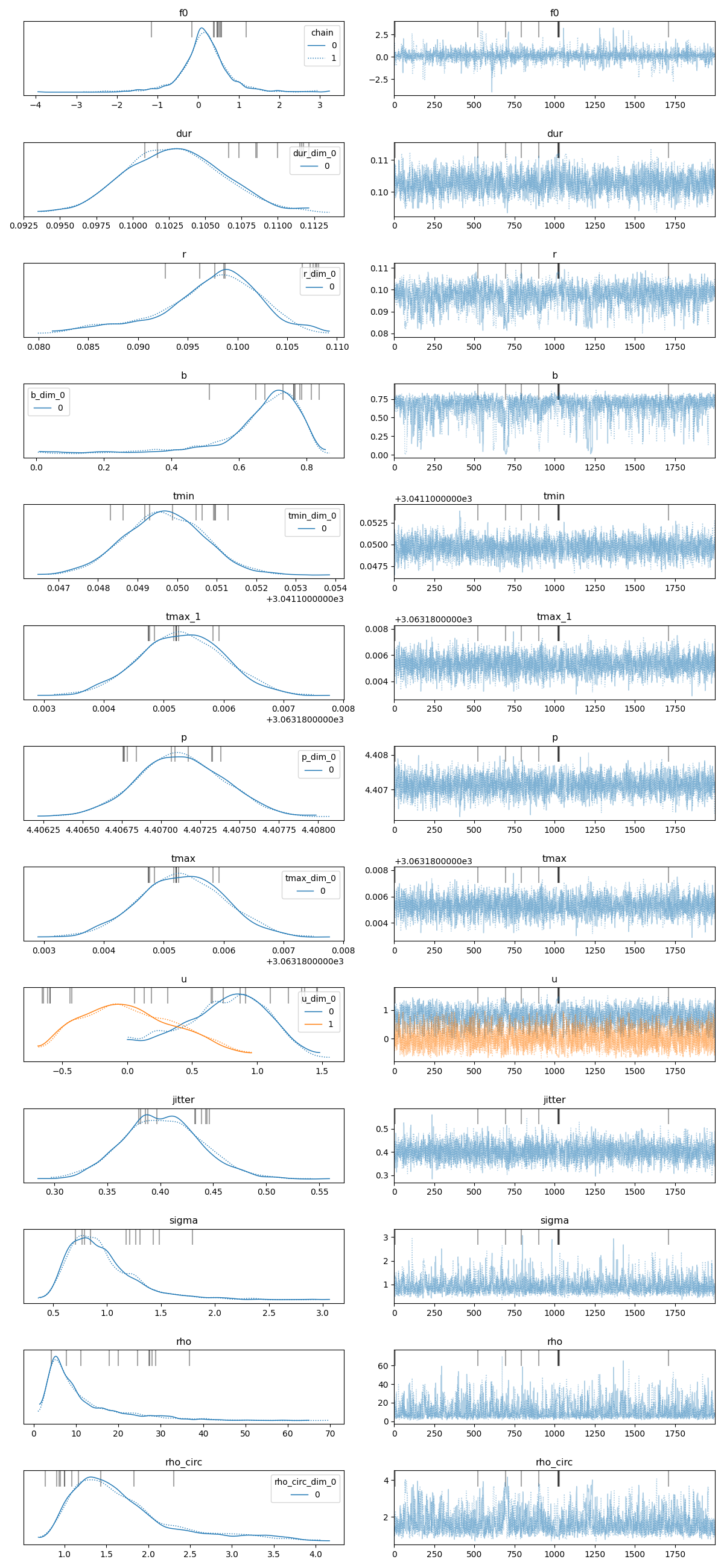
Results#
Posterior plots#
Below are plots of the posterior probability distributions and the best-fitting light-curve model.
plot_posteriors(
tic_entry, inference_data, initial_params=init_params, save=True
)

%%memit
plot_phase(
tic_entry,
planet_transit_model,
inference_data,
initial_params=init_params,
save=True,
)

Eccentricity post-processing#
As discussed above, we fit this model assuming a circular orbit which speeds things up for a few reasons:
e=0allows simpler orbital dynamics which are more computationally efficient (no need to solve Kepler’s equation numerically)There are degeneracies between eccentricity, arrgument of periasteron, impact parameter, and planet radius. Hence by setting
e=0and using the duration in calculating the planet’s orbit, the sampler can perform better.
To first order, the eccentricity mainly just changes the transit duration. This can be thought of as a change in the impled density of the star. Therefore, if the transit is fit using stellar density (or duration, in this case) as one of the parameters, it is possible to make an independent measurement of the stellar density, and in turn infer the eccentricity of the orbit as a post-processing step. The details of this eccentricity calculation method are described in Dawson & Johnson (2012).
Here, if the TIC has associated stellar data, we use the method described above to obtain fits for the exoplanet’s orbital eccentricity.
Note: a different stellar density parameter is required for each planet (if there is more than one planet)
star = tic_entry.stellar_data
star
time: 1.94 ms (started: 2023-08-11 14:20:45 +10:00)
- mass = 0.96 ± 0.12 (Msun)
- density = 0.58 ± 0.58 (solar)
time: 1.26 ms (started: 2023-08-11 14:20:45 +10:00)
if star.density_data_present:
ecc_samples = calculate_eccentricity_weights(tic_entry, inference_data)
ecc_samples.to_csv(
os.path.join(tic_entry.outdir, "eccentricity_samples.csv"), index=False
)
plot_eccentricity_posteriors(tic_entry, ecc_samples, save=True)

Diagnostics#
Finally, we also generate some diagnostic plots.
plot_diagnostics(tic_entry, planet_transit_model, init_params, save=True)
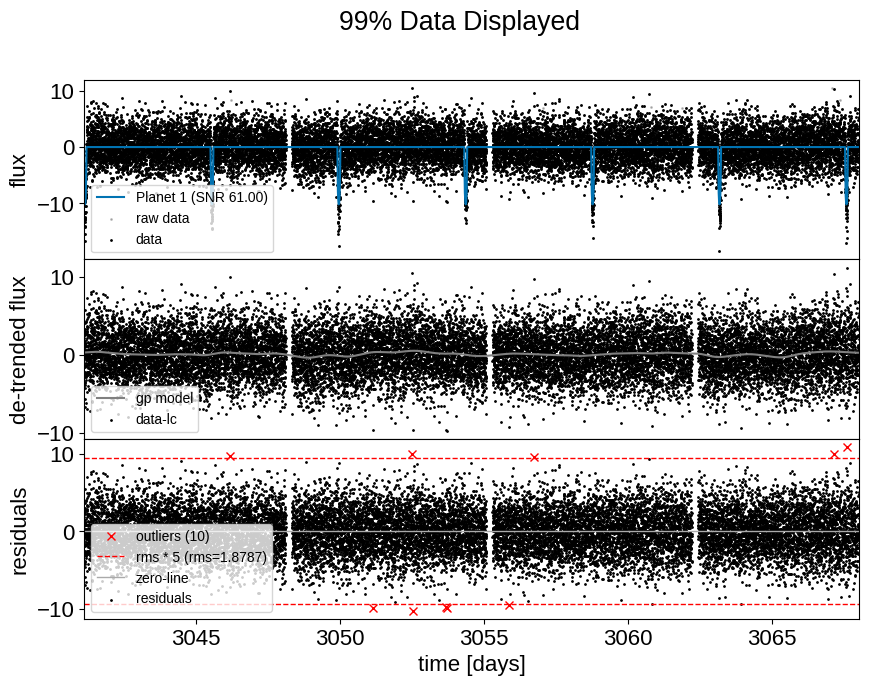
Citations#
We hope this has been helpful! The TESS-Atlas was built using exoplanet, PyMC3, lightkurve, starry, celerite2, ExoFOP, and Sphinx.
We would greatly appreciate you citing this work and its dependencies.
LaTeX acknowledgement and bibliography#
from tess_atlas import citations
citations.print_acknowledgements()
This research made use of the \textsf{TESS-Atlas} and its dependencies
\citep{exoplanet:joss, exoplanet:zenodo, celerite2:foremanmackey17,
celerite2:foremanmackey18, exoplanet:agol20, exoplanet:arviz,
exoplanet:astropy13, exoplanet:astropy18, exoplanet:kipping13,
exoplanet:luger18, exoplanet:pymc3, exoplanet:theano}.
time: 3.72 ms (started: 2023-08-11 14:20:54 +10:00)
citations.print_bibliography()
@article{exoplanet:joss,
author = {{Foreman-Mackey}, Daniel and {Luger}, Rodrigo and {Agol}, Eric
and {Barclay}, Thomas and {Bouma}, Luke G. and {Brandt},
Timothy D. and {Czekala}, Ian and {David}, Trevor J. and
{Dong}, Jiayin and {Gilbert}, Emily A. and {Gordon}, Tyler A.
and {Hedges}, Christina and {Hey}, Daniel R. and {Morris},
Brett M. and {Price-Whelan}, Adrian M. and {Savel}, Arjun B.},
title = "{exoplanet: Gradient-based probabilistic inference for
exoplanet data \& other astronomical time series}",
journal = {arXiv e-prints},
year = 2021,
month = may,
eid = {arXiv:2105.01994},
pages = {arXiv:2105.01994},
archivePrefix = {arXiv},
eprint = {2105.01994},
primaryClass = {astro-ph.IM},
adsurl = {https://ui.adsabs.harvard.edu/abs/2021arXiv210501994F},
adsnote = {Provided by the SAO/NASA Astrophysics Data System}
}
@misc{exoplanet:zenodo,
author = {Daniel Foreman-Mackey and Arjun Savel and Rodrigo Luger and
Eric Agol and Ian Czekala and Adrian Price-Whelan and
Christina Hedges and Emily Gilbert and Luke Bouma
and Timothy D. Brandt and Tom Barclay},
title = {exoplanet-dev/exoplanet v0.5.1},
month = jun,
year = 2021,
doi = {10.5281/zenodo.1998447},
url = {https://doi.org/10.5281/zenodo.1998447}
}
@article{exoplanet:pymc3,
title={Probabilistic programming in Python using PyMC3},
author={Salvatier, John and Wiecki, Thomas V and Fonnesbeck, Christopher},
journal={PeerJ Computer Science},
volume={2},
pages={e55},
year={2016},
publisher={PeerJ Inc.}
}
@article{exoplanet:theano,
title="{Theano: A {Python} framework for fast computation of mathematical
expressions}",
author={{Theano Development Team}},
journal={arXiv e-prints},
volume={abs/1605.02688},
year=2016,
month=may,
url={http://arxiv.org/abs/1605.02688}
}
@article{exoplanet:arviz,
title={{ArviZ} a unified library for exploratory analysis of {Bayesian}
models in {Python}},
author={Kumar, Ravin and Carroll, Colin and Hartikainen, Ari and Martin,
Osvaldo A.},
journal={The Journal of Open Source Software},
year=2019,
doi={10.21105/joss.01143},
url={http://joss.theoj.org/papers/10.21105/joss.01143}
}
@ARTICLE{exoplanet:kipping13,
author = {{Kipping}, D.~M.},
title = "{Efficient, uninformative sampling of limb darkening coefficients
for two-parameter laws}",
journal = {\mnras},
year = 2013,
month = nov,
volume = 435,
pages = {2152-2160},
doi = {10.1093/mnras/stt1435},
adsurl = {http://adsabs.harvard.edu/abs/2013MNRAS.435.2152K},
adsnote = {Provided by the SAO/NASA Astrophysics Data System}
}
@article{exoplanet:astropy13,
author = {{Astropy Collaboration} and {Robitaille}, T.~P. and {Tollerud},
E.~J. and {Greenfield}, P. and {Droettboom}, M. and {Bray}, E. and
{Aldcroft}, T. and {Davis}, M. and {Ginsburg}, A. and
{Price-Whelan}, A.~M. and {Kerzendorf}, W.~E. and {Conley}, A. and
{Crighton}, N. and {Barbary}, K. and {Muna}, D. and {Ferguson}, H.
and {Grollier}, F. and {Parikh}, M.~M. and {Nair}, P.~H. and
{Unther}, H.~M. and {Deil}, C. and {Woillez}, J. and {Conseil}, S.
and {Kramer}, R. and {Turner}, J.~E.~H. and {Singer}, L. and
{Fox}, R. and {Weaver}, B.~A. and {Zabalza}, V. and {Edwards},
Z.~I. and {Azalee Bostroem}, K. and {Burke}, D.~J. and {Casey},
A.~R. and {Crawford}, S.~M. and {Dencheva}, N. and {Ely}, J. and
{Jenness}, T. and {Labrie}, K. and {Lim}, P.~L. and
{Pierfederici}, F. and {Pontzen}, A. and {Ptak}, A. and {Refsdal},
B. and {Servillat}, M. and {Streicher}, O.},
title = "{Astropy: A community Python package for astronomy}",
journal = {\aap},
year = 2013,
month = oct,
volume = 558,
pages = {A33},
doi = {10.1051/0004-6361/201322068},
adsurl = {http://adsabs.harvard.edu/abs/2013A%26A...558A..33A},
adsnote = {Provided by the SAO/NASA Astrophysics Data System}
}
@article{exoplanet:astropy18,
author = {{Astropy Collaboration} and {Price-Whelan}, A.~M. and
{Sip{\H o}cz}, B.~M. and {G{\"u}nther}, H.~M. and {Lim}, P.~L. and
{Crawford}, S.~M. and {Conseil}, S. and {Shupe}, D.~L. and
{Craig}, M.~W. and {Dencheva}, N. and {Ginsburg}, A. and
{VanderPlas}, J.~T. and {Bradley}, L.~D. and
{P{\'e}rez-Su{\'a}rez}, D. and {de Val-Borro}, M.
and {Aldcroft}, T.~L. and {Cruz}, K.~L. and {Robitaille}, T.~P.
and {Tollerud}, E.~J. and {Ardelean}, C. and {Babej}, T. and
{Bach}, Y.~P. and {Bachetti}, M. and {Bakanov}, A.~V. and
{Bamford}, S.~P. and {Barentsen}, G. and {Barmby}, P. and
{Baumbach}, A. and {Berry}, K.~L. and {Biscani}, F. and
{Boquien}, M. and {Bostroem}, K.~A. and {Bouma}, L.~G. and
{Brammer}, G.~B. and {Bray}, E.~M. and {Breytenbach}, H. and
{Buddelmeijer}, H. and {Burke}, D.~J. and {Calderone}, G. and
{Cano Rodr{\'{\i}}guez}, J.~L. and {Cara}, M. and {Cardoso},
J.~V.~M. and {Cheedella}, S. and {Copin}, Y. and {Corrales}, L.
and {Crichton}, D. and {D'Avella}, D. and {Deil}, C. and
{Depagne}, {\'E}. and {Dietrich}, J.~P. and {Donath}, A. and
{Droettboom}, M. and {Earl}, N. and {Erben}, T. and {Fabbro}, S.
and {Ferreira}, L.~A. and {Finethy}, T. and {Fox}, R.~T. and
{Garrison}, L.~H. and {Gibbons}, S.~L.~J. and {Goldstein}, D.~A.
and {Gommers}, R. and {Greco}, J.~P. and {Greenfield}, P. and
{Groener}, A.~M. and {Grollier}, F. and {Hagen}, A. and {Hirst},
P. and {Homeier}, D. and {Horton}, A.~J. and {Hosseinzadeh}, G.
and {Hu}, L. and {Hunkeler}, J.~S. and {Ivezi{\'c}}, {\v Z}. and
{Jain}, A. and {Jenness}, T. and {Kanarek}, G. and {Kendrew}, S.
and {Kern}, N.~S. and {Kerzendorf}, W.~E. and {Khvalko}, A. and
{King}, J. and {Kirkby}, D. and {Kulkarni}, A.~M. and {Kumar}, A.
and {Lee}, A. and {Lenz}, D. and {Littlefair}, S.~P. and {Ma},
Z. and {Macleod}, D.~M. and {Mastropietro}, M. and {McCully}, C.
and {Montagnac}, S. and {Morris}, B.~M. and {Mueller}, M. and
{Mumford}, S.~J. and {Muna}, D. and {Murphy}, N.~A. and {Nelson},
S. and {Nguyen}, G.~H. and {Ninan}, J.~P. and {N{\"o}the}, M. and
{Ogaz}, S. and {Oh}, S. and {Parejko}, J.~K. and {Parley}, N. and
{Pascual}, S. and {Patil}, R. and {Patil}, A.~A. and {Plunkett},
A.~L. and {Prochaska}, J.~X. and {Rastogi}, T. and {Reddy Janga},
V. and {Sabater}, J. and {Sakurikar}, P. and {Seifert}, M. and
{Sherbert}, L.~E. and {Sherwood-Taylor}, H. and {Shih}, A.~Y. and
{Sick}, J. and {Silbiger}, M.~T. and {Singanamalla}, S. and
{Singer}, L.~P. and {Sladen}, P.~H. and {Sooley}, K.~A. and
{Sornarajah}, S. and {Streicher}, O. and {Teuben}, P. and
{Thomas}, S.~W. and {Tremblay}, G.~R. and {Turner}, J.~E.~H. and
{Terr{\'o}n}, V. and {van Kerkwijk}, M.~H. and {de la Vega}, A.
and {Watkins}, L.~L. and {Weaver}, B.~A. and {Whitmore}, J.~B. and
{Woillez}, J. and {Zabalza}, V. and {Astropy Contributors}},
title = "{The Astropy Project: Building an Open-science Project and Status
of the v2.0 Core Package}",
journal = {\aj},
year = 2018,
month = sep,
volume = 156,
pages = {123},
doi = {10.3847/1538-3881/aabc4f},
adsurl = {http://adsabs.harvard.edu/abs/2018AJ....156..123A},
adsnote = {Provided by the SAO/NASA Astrophysics Data System}
}
@article{exoplanet:luger18,
author = {{Luger}, R. and {Agol}, E. and {Foreman-Mackey}, D. and {Fleming},
D.~P. and {Lustig-Yaeger}, J. and {Deitrick}, R.},
title = "{starry: Analytic Occultation Light Curves}",
journal = {\aj},
year = 2019,
month = feb,
volume = 157,
pages = {64},
doi = {10.3847/1538-3881/aae8e5},
adsurl = {http://adsabs.harvard.edu/abs/2019AJ....157...64L},
adsnote = {Provided by the SAO/NASA Astrophysics Data System}
}
@article{exoplanet:agol20,
author = {{Agol}, Eric and {Luger}, Rodrigo and {Foreman-Mackey}, Daniel},
title = "{Analytic Planetary Transit Light Curves and Derivatives for
Stars with Polynomial Limb Darkening}",
journal = {\aj},
year = 2020,
month = mar,
volume = {159},
number = {3},
pages = {123},
doi = {10.3847/1538-3881/ab4fee},
adsurl = {https://ui.adsabs.harvard.edu/abs/2020AJ....159..123A},
adsnote = {Provided by the SAO/NASA Astrophysics Data System}
}
@article{exoplanet:foremanmackey17,
author = {{Foreman-Mackey}, D. and {Agol}, E. and {Ambikasaran}, S. and
{Angus}, R.},
title = "{Fast and Scalable Gaussian Process Modeling with Applications to
Astronomical Time Series}",
journal = {\aj},
year = 2017,
month = dec,
volume = 154,
pages = {220},
doi = {10.3847/1538-3881/aa9332},
adsurl = {http://adsabs.harvard.edu/abs/2017AJ....154..220F},
adsnote = {Provided by the SAO/NASA Astrophysics Data System}
}
@article{exoplanet:foremanmackey18,
author = {{Foreman-Mackey}, D.},
title = "{Scalable Backpropagation for Gaussian Processes using Celerite}",
journal = {Research Notes of the American Astronomical Society},
year = 2018,
month = feb,
volume = 2,
number = 1,
pages = {31},
doi = {10.3847/2515-5172/aaaf6c},
adsurl = {http://adsabs.harvard.edu/abs/2018RNAAS...2a..31F},
adsnote = {Provided by the SAO/NASA Astrophysics Data System}
}
time: 1.29 ms (started: 2023-08-11 14:20:54 +10:00)
Packages used#
citations.print_packages()
zipp==3.6.0
xarray==0.19.0
widgetsnbextension==3.5.1
wheel==0.37.0
websocket-client==1.2.1
webencodings==0.5.1
wcwidth==0.2.5
virtualenv==20.8.1
urllib3==1.26.7
uncertainties==3.1.6
uc-micro-py==1.0.1
typing-extensions==3.10.0.2
traitlets==5.1.0
tqdm==4.62.3
tornado==6.1
tomli==1.2.1
toml==0.10.2
tinycss2==1.2.1
threadpoolctl==3.0.0
Theano-PyMC==1.1.2
testpath==0.5.0
testbook==0.4.2
tess-atlas==0.2.1.dev314+ge1761e8
terminado==0.12.1
tenacity==8.0.1
tar-progress==1.3.3
tabulate==0.8.10
tables==3.7.0
StrEnum==0.4.15
SQLAlchemy==1.4.26
sphinxcontrib-serializinghtml==1.1.5
sphinxcontrib-qthelp==1.0.3
sphinxcontrib-jsmath==1.0.1
sphinxcontrib-htmlhelp==2.0.0
sphinxcontrib-devhelp==1.0.2
sphinxcontrib-bibtex==2.2.1
sphinxcontrib-applehelp==1.0.2
Sphinx==5.0.2
sphinx-toolbox==3.1.2
sphinx-togglebutton==0.2.2
sphinx-thebe==0.2.1
sphinx-tabs==1.2.1
sphinx-remove-toctrees==0.0.3
sphinx-prompt==1.5.0
sphinx-panels==0.6.0
sphinx-multitoc-numbering==0.1.3
sphinx-jupyterbook-latex==0.5.2
sphinx-jinja2-compat==0.1.2
sphinx-external-toc==0.3.1
sphinx-design==0.3.0
sphinx-copybutton==0.4.0
sphinx-comments==0.0.3
sphinx-collapse==0.1.2
sphinx-book-theme==1.0.1
sphinx-autodoc-typehints==1.18.3
soupsieve==2.2.1
snowballstemmer==2.1.0
sniffio==1.2.0
smmap==4.0.0
six==1.16.0
setuptools==47.1.0
Send2Trash==1.8.0
semver==2.13.0
SecretStorage==3.3.1
seaborn==0.11.2
scipy==1.7.1
scikit-learn==1.0
SciencePlots==1.0.9
ruamel.yaml==0.17.21
ruamel.yaml.clib==0.2.6
requests==2.26.0
requests-unixsocket==0.2.0
regex==2021.10.21
pyzmq==22.3.0
PyYAML==6.0
pyvo==1.1
pytz==2021.3
python-dateutil==2.8.2
pytest==7.4.0
pytest-cov==4.1.0
pyrsistent==0.18.0
pyparsing==2.4.7
Pympler==1.0.1
pymc3==3.11.4
pymc3-ext==0.1.0
Pygments==2.15.1
pyflakes==2.4.0
pyerfa==2.0.0
pydmove==1.1
pydata-sphinx-theme==0.13.3
pycparser==2.20
pycodestyle==2.8.0
pybtex==0.24.0
pybtex-docutils==1.0.1
py==1.10.0
ptyprocess==0.7.0
psutil==5.9.1
prompt-toolkit==3.0.20
prometheus-client==0.11.0
pretty-jupyter==2.0.5
posthog==3.0.1
pluggy==1.0.0
plotly==5.3.1
ploomber-engine==0.0.30
ploomber-core==0.2.12
platformdirs==2.4.0
pip==23.2.1
Pillow==8.4.0
pikepdf==5.1.3
pickleshare==0.7.5
pexpect==4.8.0
patsy==0.5.2
pathspec==0.9.0
parso==0.8.2
pandocfilters==1.5.0
pandas==1.3.4
packaging==21.0
opencv-python==4.6.0.66
oktopus==0.1.2
numpy==1.21.3
numexpr==2.8.3
notebook==6.4.5
nodeenv==1.6.0
netCDF4==1.5.7
nest-asyncio==1.5.1
nbformat==5.1.3
nbdime==3.1.0
nbconvert==6.5.4
nbclient==0.5.4
natsort==8.1.0
myst-parser==0.18.1
myst-nb==0.17.2
mypy-extensions==0.4.3
msgpack==1.0.4
monotonic==1.6
mock==4.0.3
mistune==0.8.4
mimeparse==0.1.3
memory-profiler==0.60.0
memoization==0.4.0
mdit-py-plugins==0.3.5
mccabe==0.6.1
matplotlib==3.4.3
matplotlib-inline==0.1.3
MarkupSafe==2.0.1
markdown-it-py==1.1.0
lxml==4.6.4
lockfile==0.12.2
linkify-it-py==2.0.2
lightkurve==2.0.11
latexcodec==2.0.1
kiwisolver==1.3.2
keyring==23.2.1
jupytext==1.11.5
jupyterlab-widgets==1.0.2
jupyterlab-pygments==0.2.2
jupyter-sphinx==0.3.2
jupyter-server==1.11.1
jupyter-server-mathjax==0.2.3
jupyter-resource-usage==0.6.1
jupyter-nbextensions-configurator==0.4.1
jupyter-latex-envs==1.4.6
jupyter-highlight-selected-word==0.2.0
jupyter-core==4.8.1
jupyter-contrib-nbextensions==0.5.1
jupyter-contrib-core==0.3.3
jupyter-client==6.1.12
jupyter-cache==0.6.1
jupyter-book==0.15.1
jsonschema==3.2.0
joblib==1.1.0
Jinja2==3.0.2
jeepney==0.7.1
jedi==0.18.0
itables==1.5.3
isort==5.9.3
ipywidgets==7.6.5
ipython==7.28.0
ipython-genutils==0.2.0
ipykernel==6.4.2
interruptingcow==0.8
iniconfig==1.1.1
importlib-resources==5.3.0
importlib-metadata==4.8.1
img2pdf==0.4.4
imagesize==1.4.1
idna==3.3
identify==2.3.0
html5lib==1.1
h5py==3.7.0
greenlet==1.1.2
GitPython==3.1.24
gitdb==4.0.7
future==0.18.2
flake8==4.0.1
filelock==3.3.1
fbpca==1.0
fastprogress==1.0.0
exoplanet==0.5.1
exoplanet-core==0.1.2
exceptiongroup==1.1.2
enum34==1.1.10
entrypoints==0.3
emcee==3.1.2
dynesty==1.0.1
domdf-python-tools==3.3.0
docutils==0.16
distlib==0.3.3
dill==0.3.4
dict2css==0.3.0
defusedxml==0.7.1
decorator==5.1.0
debugpy==1.5.1
debuglater==1.4.4
cycler==0.10.0
cssutils==2.5.0
cryptography==35.0.0
coverage==7.2.7
corner==2.2.1
colorama==0.4.4
click==7.1.2
charset-normalizer==2.0.7
cftime==1.5.1
cfgv==3.3.1
cffi==1.15.0
certifi==2021.10.8
Cerberus==1.3.4
celerite2==0.2.0
cachetools==4.2.4
CacheControl==0.12.11
pre-commit==2.15.0
bokeh==2.4.1
bleach==4.1.0
black==21.9b0
bilby==1.1.5
beautifulsoup4==4.10.0
backports.entry-points-selectable==1.1.0
backoff==2.2.1
backcall==0.2.0
Babel==2.9.1
autograd==1.3
autodocsumm==0.2.8
attrs==21.2.0
astroquery==0.4.3
astropy==4.3.1
arviz==0.11.4
argon2-cffi==21.1.0
apeye==1.2.0
anyio==3.3.4
alabaster==0.7.12
aesara-theano-fallback==0.0.4
accessible-pygments==0.0.4
ipython-autotime==0.3.1
jupyternotify==0.1.15
jupyter==1.0.0
qtconsole==5.3.1
jupyter-console==6.4.4
QtPy==2.1.0
time: 1.44 ms (started: 2023-08-11 14:20:54 +10:00)

Comments#
Leave a comment below or in this issue.